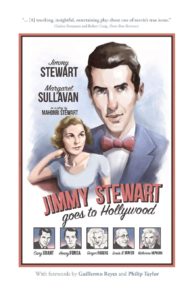 Review
Review
Title: Jimmy Stewart Goes To Hollywood
Author: Mahonri Stewart
Publisher: Prospero Arts and Media
Genre: Play
Year Published: 2019
Number of Pages: 147
Binding: Paperback
ISBN: 9781072267997
Price: $12.00
Reviewed by Trevor Holyoak for the Association for Mormon Letters
I don’t usually read play scripts – the last time was when I did my one performance as an adult, playing the part of the reverend in “The Best Christmas Pageant Ever” alongside my daughter about 10 years ago. But I have been a fan of Jimmy Stewart since I was a kid, when “It’s a Wonderful Life” became one of my favorite movies and “Mr. Krueger’s Christmas”[1] became part of my Christmas tradition. I admit I’ve seen just a fraction of his movies – I count at least seven – but my other favorites so far are “Mr. Smith Goes to Washington” and “The Shop Around the Corner.”
This play is a brief biography of James Stewart from the premise that his friend Margaret Sullavan is the person that got him involved in movies. It also features his interactions with Cary Grant, Henry Fonda, Ginger Rogers, Katherine Hepburn, and Louis B. Mayer (the boss at MGM). The book also includes two forewords, by Guillermo Reyes and Philip Taylor, and an afterward by the author. It has many photographs throughout of the actors who performed the play at the Covey Center for the Arts in 2014.
The author, Mahonri Stewart, has written plays, screenplays, graphic novels, poetry, and novels, and has degrees from Arizona State University and Utah Valley University. In the afterword, he explains why he wrote the play. He talks about movies like “Mr. Smith Goes to Washington” and how they portray “the Honest Man [who] is at first intimidated and awed by the city’s glamour and power, even seduced by its pleasures, but as the story continues, he discovers the compromised underbelly of the machine, the city’s corruption, selfishness, and vice that keeps its elites in their charmed circles, wealth, and seats of power….The City turns on the good man and nearly succeeds in destroying this hayseed threat in it midst. Yet, he has been underestimated, and the Honest Man then rises up after near defeat and takes on the Monolith again, this time in a dearly bought and painful victory” (page 141).
In this play, Jimmy Stewart is the “Honest Man” and the “City” is Hollywood. We see glimpses of his early career, as he is reluctantly cast in his first play, finds he enjoys acting, and then eventually is helped by friends to be reluctantly cast in his first movie and hired by MGM. He ends up standing up to the MGM boss and Hollywood corruption, and successfully going independent while keeping much of his original values.
The author successfully shows that Stewart’s life story has many similarities to several of the movies he’s most famous for. I also found it interesting that he had bigger dreams than to run the family business, as his father wanted, but instead of ending up staying in his hometown, as in “It’s A Wonderful Life,” he followed his dreams and eventually earned his father’s respect for it.
Since it is a biography, the play does deal with the realities of Stewart’s life experiences and those of his associates in Hollywood, but it is kept to a PG-13 level. We learn of his relationships with several actresses, including Margaret Sullivan (who he apparently loved but never had more than a friendship with), Ginger Rogers, and Gloria McLean, who became his wife. He also has to deal with some suspicions that people such as Louis Mayer have based on his living arrangements and association with Henry Fonda and Josh Logan.
This was a quick (it is a play, after all) but very enjoyable read. It made me want to watch more of Stewart’s movies and learn more about his life. I would definitely be interested in seeing this play performed.
[1] See https://www.deseret.com/2003/12/9/19800296/jimmy-stewart-brought-life-to-mr-krueger for a very interesting story of how Jimmy Stewart became involved in “Mr. Krueger’s Christmas.”
�
